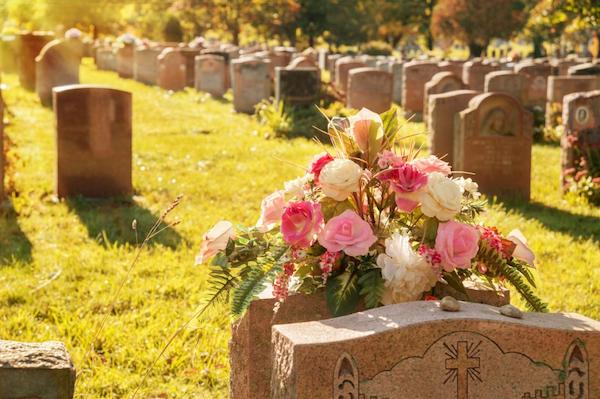
[D]eath is something that we all, sooner or later, have to face. But how do we respond to it? Why are some of us more afraid than others? And what is it, exactly, that scares us about death? We offer an overview of theories related to death anxiety, and what you can do to address it.
To a greater or lesser extent, it is likely that we are all scared of death – whether it be the thought of our own cessation or the fear that someone we love might pass away. The thought of death is not a pleasant one, and many of us avoid such morbid musings, naturally choosing to focus on what life has to offer, as well as on our own wishes and goals, instead.
Yet, as Benjamin Franklin once famously wrote, “In this world nothing can be said to be certain, except death and taxes,” so it is no surprise that death-related worries sometimes take us by storm.
Fear of death is sometimes referred to as “thanatophobia,” deriving from the Ancient Greek words “Thanatos,” the name of the god of death, and “phobos,” meaning “fear.”
Notably, thanatophobia – which is called “death anxiety” in a clinical context – is not listed as a disorder in its own right in the Diagnostic and Statistical Manual of Mental Disorders. Still, this rarely spoken-about anxiety has the potential to seriously affect people’s lifestyles and emotional health.
Thanatophobia: Natural or trauma-driven?
Thanatophobia was first tackled by Sigmund Freud, who did not consider it to be fear of death, as such. Freud thought that we cannot truly believe in death as a real occurrence, so any death-related fears must stem from unaddressed childhood trauma.
But it was the theory put forth a little later by an anthropologist called Ernst Becker that ended up informing most current understandings of death anxiety and its causes. Becker believed that death anxiety comes naturally to all people who find the thought of death and dying unacceptable.
That is why, he argued, everything everyone does – the goals we set, our passions and hobbies, and the activities we engage in – is, in essence, a coping strategy, and that these are things we focus on so we that need not worry about our eventual death.
Becker’s work gave rise to “terror management theory” (TMT), which posits that humans must constantly deal with an internal conflict: the basic desire to live against the certainty of death. TMT emphasizes individuals’ self-consciousness and their drive to achieve personal goals, motivated by the awareness of mortality.
Also, according to TMT, self-esteem is key for the degree to which individuals experience death anxiety. People with high self-esteem are better at managing fear of death, while people with low self-esteem are more easily intimidated by death-related situations.
Some newer approaches suggest a “middle way” between TMT and another theory referred to as “separation theory,” which highlights the importance of early trauma, reinforced by an awareness of mortality later in life.
Another recent approach to understanding and explaining death anxiety is that of “post-traumatic growth theory” (PTG). According to PTG, going through a distressing event – such as the death of a loved one or receiving a worrying health diagnosis – can actually have a positive effect, causing individuals to appreciate the small things in life a lot more, or to become more goal-oriented.
Death anxiety as a disorder
Although it is likely that we will all be worried about death or a death-related situation at some time in our lives, death anxiety is only pathological when it reaches extreme levels, disrupting the normal lifestyle of an individual.
One account of death anxiety – as reported by a man’s worried wife – emphasizes how this kind of fear can become obsessive and get out of control.
“The fear is specifically of death (not pain or dying as such) and the emptiness of it (he’s not religious) and the fact that he will no longer be here. […] this is an irrational, emotional fear that he has trouble controlling. Recently it has got worse – he’s not sure why – but it has made him feel panicky and the thoughts have been straying into the daytime.”
Who is afraid of death?
Dr. Robert Kastenbaum has reviewed various psychology theories and studies related to the concept of death, outlining which populations are most likely to express a persistent fear of death. Drs. Patricia Furer and John Walker summarize the findings in an article published in the Journal of Cognitive Psychotherapy.

- The majority of individuals are afraid of death. Most people tend to fear death, but they usually only exhibit low to moderate levels of anxiety.
- Women tend to be more afraid of death than men. Additionally, a newer study has found that while death anxiety seems to surface in both women and men during their 20s, women also experience a second surge of thanatophobia when they reach their 50s.
- Young people are just as likely to experience death anxiety as elderly people.
- There appears to be some correlation between a person’s educational and socioeconomic status and reduced death anxiety.
- No association has been found between religious engagement and reduced death anxiety.
Specialists argue that more often than not, death anxiety does not come on its own, and that it is instead accompanied by another type of mental health disorder (such as generalized anxiety disorder, panic disorder, post-traumatic stress disorder, depression, or obsessive-compulsive disorder).
Other studies show that people exhibiting health anxiety, or hypochondriasis, are also affected by death anxiety, as it naturally correlates with an excessive worry about health.
Complete Article HERE!
